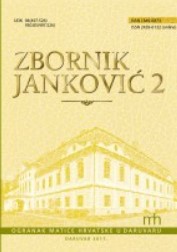„Ustaška demokracija“ – izbor načelnika, donačelnika i gradskog zastupstva grada Zagreba 1944. godine
“Democracy of the Ustaše” – mayoral, vice-mayoral and city council elections for Zagreb in 1944
Author(s): Marijan LipovacSubject(s): Local History / Microhistory, Political history, Government/Political systems, Electoral systems, Political behavior, WW II and following years (1940 - 1949)
Published by: Matica hrvatska Daruvar
Keywords: Zagreb; NDH; Ante Pavelić; Ivan Oršanić; estate system;
Summary/Abstract: In accordance with the principles of the Ustaša movement, in the Independent State of Croatia (NDH) it was rejected system of liberal democracy and the people should be divided according to estates or professions. In November 1941 poglavnik Ante Pavelić founded the General union of estates and other units, which consisted 16 estate and professional organizations. On its top in May 1944 came Ivan Oršanić, who suggested to Pavelić to organize the elections for Parliament and local authorities on estate principles in order to get important legitimacy at Western allies. After mayor of Zagreb Ivan Werner died in June 1944, Pavelić decided that the new mayor, the deputy mayor and the newly established City council will be elected by representatives of estate organizations. Elections were held on 18 August 1944, Eugen Starešinić was elected the city mayor and Franjo Mokrović his deputy. Pavelić confirmed their election, and in his speech for the first time rehabilitated by then proscribed term of democracy, saying that in NDH has been built „Ustaša democracy”. In October 1944, on the same way city leaders in Sisak, Karlovac and Dubrovnik were elected, while a similar model of elections has been already held in March 1943 in the village of Gračani near Zagreb. Pavelić and the Ustaša propaganda announced that elections for Parliament will be held on the same way, but they have never been realized. Episode with local elections based on the „Ustaša democracy” model is therefore reduced to only a propaganda move which aim was gaining the support of the people and a better image at future war winners. However, at the end of the NDH, when its leadership tried to curry favor with Western allies, this episode could no longer be proof that NDH has not been led by fascist ideology, on the contrary, it is not even mentioned.
Journal: Zbornik Janković
- Issue Year: II/2017
- Issue No: 2
- Page Range: 228-251
- Page Count: 24
- Language: Croatian

